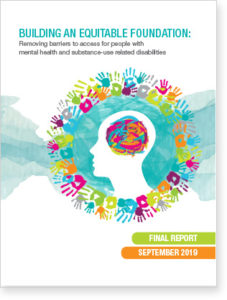CMHA BC releases new report offering 12 recommendations to achieve fair and equal public services for all British Columbians.
 The Canadian Mental Health Association, BC Division (CMHA BC) has published a new report on the social determinants of mental health and examines the ways that crucial BC services like social housing, social assistance and employment supports, can support or undermine the human rights and wellness of those living with mental health or substance use-related health issues.
The Canadian Mental Health Association, BC Division (CMHA BC) has published a new report on the social determinants of mental health and examines the ways that crucial BC services like social housing, social assistance and employment supports, can support or undermine the human rights and wellness of those living with mental health or substance use-related health issues.
The report, Building an Equitable Foundation: Removing barriers to access for people with mental health and substance-use related disabilities, outlines 12 recommendations to achieve fair and equal public services for all British Columbians. CMHA BC is also calling on the Province to investigate how BC’s current laws and public services meet the needs of people with mental health or substance-use related disabilities.
“Under international human rights law, everyone has the right to their best mental health,” noted Kendra Milne, Senior Director of Policy, Planning and Government Relations at the Canadian Mental Health Association, BC Division (CMHABC) and co-author of the report. “To achieve that, we know that people need access to healthcare, but they also need to have their basic needs met to create the necessary foundation for them to be healthy and recover from illness. Those needs include secure housing, income and employment supports as well as the need for social inclusion – to be a valued and equal member of the community, for social connection and a feeling of belonging, and freedom from constant stress.”
The report is based on the first-hand experiences of 44 people living with mental health or substance use-related health issues in communities around BC. Report authors also sought the input of more than 100 front-line mental health and poverty workers throughout the province.
“Public services like social assistance, social housing and employment supports have the potential to allow people to avoid stress and crisis, but they are also a key opportunity for connection and for showing people experiencing a health crisis that they are valuable members of our communities,” said Milne. “We have the opportunity to design public services that welcome people and give them a sense of belonging by treating them with dignity and respect. Not doing so can mean that people are unable to access the social supports they need as well as experiencing shame and exclusion in the process, which can worsen their mental health and violate their human rights.”
“BC has made good progress in recent years with a poverty reduction plan, changes to social assistance and new social housing stock, but we heard from people around BC that there is still work to do,” said Jonny Morris, CEO of CMHA BC. “We need to continue to be vigilant to change the culture and design of some of our public services to ensure that they support the wellness and human rights of people with mental health or substance use-related health issues.”
The report recommends that the BC Human Rights Commissioner, or alternatively a newly created independent provincial Mental Health Advocate, investigate how BC’s laws and public services support the human rights of people with mental health or substance-use related disabilities. It also recommends that BC take steps to remedy number of concerns raised by the people who shared their experiences for the project to ensure that BC’s social assistance, social housing and supportive employment support people’s wellness and recovery from illness.
The report will be distributed to provincial law makers and the BC Human Rights Commissioner.
Read the brief Executive Summary
About the Canadian Mental Health Association (CMHA)
CMHA is Canada’s most established mental health charity and the nation-wide leader and champion for mental health. CMHA helps people access the resources they need to maintain and improve mental health, build resilience, and support recovery from mental illness. Each year in BC alone, CMHA serves more than 100,000 people all across the province. For mental health and addiction information and resources visit www.staging.cmha-bc.flywheelsites.com
Media Contact:
Lorna Allen
External Relations Specialist, CMHA BC Division
P: 604-688-3234 ext. 6326
C: 778-858-8805
E: lorna.allen@cmha.bc.ca
